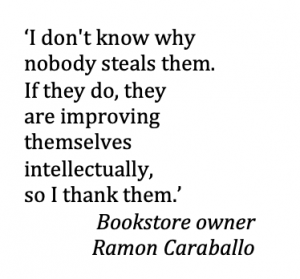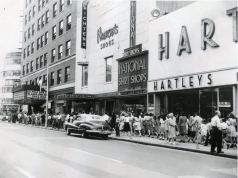For eight years after he arrived in New York City from Cuba, Ramon Caraballo sold used children’s books out of a suitcase on the streets of Queens.
He moved from the streets to a storefront 16 years ago when he opened Barco de Papel, one of the few Spanish-language bookstores in the city, and a thriving community center.
“People come here to find information about their culture, to meet people,” he says. “They come here looking for books but have also found friends, jobs and advice. The only thing that hasn’t happened here yet is a couple falling in love.”
Barco de Papel means “paper boat” in Spanish, a tribute to a children’s poem by Cuban writer Nicolas Guillen. The poem narrates the journey of a white man and a black woman sailing the islands of the Caribbean.
Caraballo came to New York in 1995 and settled in Jackson Heights. He saw sidewalks crowded with vendors selling food and crafts on Roosevelt Avenue, the predominantly Hispanic neighborhood’s main drag, and decided to sell children’s books in Spanish.
Barco de Papel is on the same street, but now offers books for adults and teenagers.
New and used books crowd the store, only the size of a typical bedroom, filling floor-to-ceiling bookcases on all four walls.
Titles include Spanish classics like “Don Quixote” and “Twenty Love Poems and A Song of Despair,” by the Chilean author and Nobel Prize for Literature winner Pablo Neruda, as well Spanish translations of modern novels like “The Girl Who Played with Fire” and the “Twilight” series.
Piles of books cover the floor, leaving a small area in the middle of the room for customers – “friends of the bookstore,” Caraballo calls them — to read and chat.
Abel Trinidad, a 34-year-old Jackson Heights resident, came to Barco de Papel to get a copy of “Don Quixote.”
 “When I wanted a good book of literature and poetry in Spanish I come here,” Trinidad, a native of Mexico, says in Spanish. “In other bookstores, they only sell expensive, recent editions of famous books; Here they have everything.”
“When I wanted a good book of literature and poetry in Spanish I come here,” Trinidad, a native of Mexico, says in Spanish. “In other bookstores, they only sell expensive, recent editions of famous books; Here they have everything.”
Two years ago, Caraballo added an English section to the bookstore.
“We need to adjust to the needs of the community,” says Caraballo. “Parents who brought their children to our children’s story time in Spanish started to ask for books in English.”
Caraballo says the store has changed over time.
“I’ve seen how the bookstore has grown with the community,” he says. “Children I saw buy their first books here are now adults. People come here to talk and also to help me or find themselves in the books I sell.”
One recent day, as Caraballo organized bookshelves, local business owners and passersby stepped in the store to say hello or drop off a soda or a Cuban sandwich.
Barco de Papel customers think of the bookstore as a center of Hispanic culture.
Rafael Sosa, a veterinarian from Cuba who left the island in 2014, rides the subway for half an hour every week to visit the bookstore, even if he doesn’t plan to buy a book.
“Here I find my community, and I have made friends here like Ramon who are now family,” says Sosa, in Spanish. “Here, I buy the books I had back home to build my personal library. Seeing the same books, it’s like being back in your country.”
Paula Ortiz organizes community events at the store.
Ortiz, a high school biology teacher, has volunteered in Banco de Papel since it opened. She plans weekly children’s story time, often portraying characters like Frida Kahlo, the renowned Mexican artist.
She believes the bookstore serves an important role in the area’s Hispanic community.
“If we are not here, what books in Spanish are we going to read our kids?” says Ortiz, a native of Colombia. “We are preserving authors and their words for future generations.”
She says the bookstore is a place for people to get together and help each other through their struggles.
“On occasion, this bookstore is like a therapist’s office,” says Ortiz. “People come in worried or talking about their problems. Ramon, who is the soul of the store, gives them advice and recommends them books to guide them.”
Outside the store, a mural honoring another Nobel Prize for Literature winner, Colombian writer Gabriel Garcia Marquez, gazes over tables and carts filled with books selling for $2 and $3.
Caraballo doesn’t worry someone might steal them.
“In this community, books are sacred,” says Caraballo. “I don’t know why nobody steals them. If they do, they are improving themselves intellectually, so I thank them.”
To Caraballo, the life of the store is in the people who buy books or just swing by.
“Barco de Papel is more than just a bookstore,” he says. “There are stories in the books but It’s the story of the people that come in here that make this place unique.”
Valentina Palm is a reporter in the Caplin News’s New York City Bureau.




































